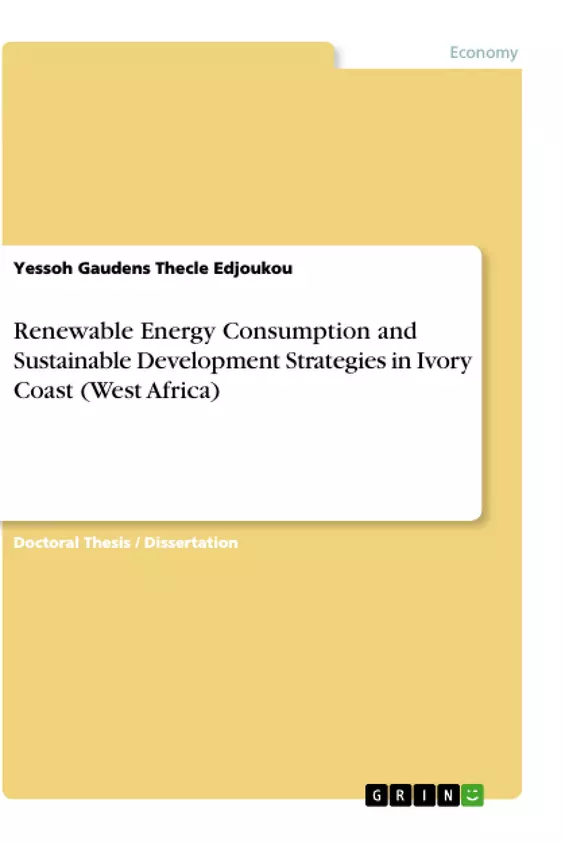A sustainable energy regime, especially for developing countries such as Ivory Coast, is a wise choice. It can mobilize renewable energy resources, modernize energy system, allow for energy savings, safeguard the equilibrium of local ecosystems, contribute to poverty alleviation and, therefore, constitutes a significant aid towards universal access to modern energy services.
This current research investigates the conditions needed to achieve a sustainable energy regime by the next decade (2030) in Ivory Coast, West Africa. To identify these conditions, first, a forecast model using a hybrid method, support vector regression (SVR) and an autoregressive integrated moving average (ARIMA) was employed to predict energy consumption by 2030. Second, a back-casting approach to assessing alternative energy scenarios was carried out. Third, a national energy action plan (NEAP) was designed with the help of a multi-criteria decision analysis (MCDA) and a technique known as the fuzzy analytic hierarchy process (AHP).
The results show that, by 2030, conventional fuels should be dominant in the transport and industrial sectors, while traditional forms of energy should prevail over others in the residential one. Besides, the green scenario that accumulates universal energy access, energy efficiency, and renewable energies dissemination targets are the most sustainable. Moreover, social criterion and solar energy were found the most critical factor and the most preferred renewable energy, respectively, when considering a sustainable energy path.
Based on those findings, it was recognized that a definite shift in energy policy maximizing the use of clean types of energy was required to reach a sustainable energy regime. In this perspective, policy recommendations, in addition to the national energy action plan, were provided to guide the Ivorian decision-makers.
Inhaltsverzeichnis (Table of Contents)
- CHAPTER I: INTRODUCTION
- 1.1 General introduction
- 1.2 Theoretical frameworks
- 1.3 Research objectives and findings
- 1.4 Research and conceptual frameworks
- 1.5 Originality and significance of the study
- CHAPTER II: LITERATURE REVIEW
- 2.1 Energy demand forecast
- 2.2 Multi-criteria decision analysis
- 2.3 Renewable energy consumption and sustainable development strategies
- 2.4 Comparison with other studies
- 2.5 Summary of the chapter
- CHAPTER III: OVERVIEW OF THE ENERGY SECTOR IN IVORY COAST
- 3.1 Organization of the Ivorian energy sector
- 3.2 Energy resources, supply, and demand
- 3.3 Power sector and energy access
- 3.4 Economy and demographic trend
- 3.5 Summary of the chapter
- CHAPTER IV: FORECAST MODEL RESULTS
- 4.1 Forecast methodological approach
- 4.2 Data description
- 4.3 Forecast model's results
Zielsetzung und Themenschwerpunkte (Objectives and Key Themes)
This research aims to explore the conditions necessary for achieving a sustainable energy regime in Ivory Coast by 2030. This study analyzes the energy consumption patterns and identifies potential solutions through forecasting models, alternative energy scenarios, and multi-criteria decision analysis.
- Sustainable energy consumption in developing nations
- Energy forecasting methodologies and their applications
- Assessing alternative energy scenarios and strategies
- National energy action planning and policy recommendations
- The role of renewable energy sources in sustainable development
Zusammenfassung der Kapitel (Chapter Summaries)
- Chapter I: Introduction
This chapter introduces the research context and its relevance, setting the stage for the study's objectives and framework. It also highlights the significance of the research and its contribution to knowledge.
- Chapter II: Literature Review
This chapter presents a comprehensive overview of existing research on energy demand forecasting, multi-criteria decision analysis, and renewable energy consumption within the context of sustainable development. It compares the findings of this study with previous works.
- Chapter III: Overview of the Energy Sector in Ivory Coast
This chapter provides a detailed analysis of the energy sector in Ivory Coast, covering the organization of the sector, energy resources, supply and demand dynamics, power sector and energy access, and economic and demographic trends.
- Chapter IV: Forecast Model Results
This chapter presents the results of the forecast model employed to predict energy consumption by 2030 in Ivory Coast. It discusses the methodological approach, data description, and the key findings of the model.
Schlüsselwörter (Keywords)
The central themes and concepts explored in this work include energy demand, energy forecasting, sustainable energy, energy planning, renewable energy, multi-criteria decision analysis, national energy action plans, Ivory Coast, and West Africa.
Frequently Asked Questions
What is the main goal of the research regarding Ivory Coast's energy sector?
The research investigates the conditions necessary to achieve a sustainable energy regime in Ivory Coast by the year 2030, focusing on universal access and renewable energy integration.
Which forecasting models were used to predict energy consumption?
The study employed a hybrid method combining Support Vector Regression (SVR) and an Autoregressive Integrated Moving Average (ARIMA) model to forecast energy demand up to 2030.
What are the predicted energy trends for different sectors in Ivory Coast?
By 2030, conventional fuels are expected to dominate the transport and industrial sectors, while traditional forms of energy are likely to remain prevalent in the residential sector.
Which renewable energy source is considered the most preferred in the study?
Solar energy was identified as the most preferred renewable energy source when considering a sustainable energy path for Ivory Coast.
What is a National Energy Action Plan (NEAP)?
A NEAP is a strategic roadmap designed using multi-criteria decision analysis (MCDA) to guide policy-makers in achieving energy efficiency and expanding renewable energy dissemination.
- Arbeit zitieren
- Yessoh Gaudens Thecle Edjoukou (Autor:in), 2020, Renewable Energy Consumption and Sustainable Development Strategies in Ivory Coast (West Africa), München, GRIN Verlag, https://www.grin.com/document/1119900



